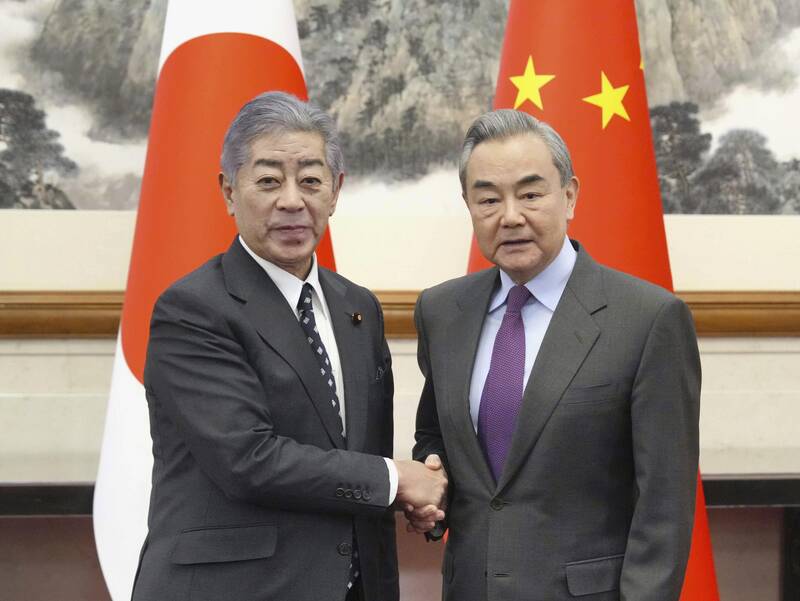Japanese foreign minister Takeshi Iwaya raised “serious concerns” on Wednesday over China’s military buildup as he met counterpart Wang Yi in Beijing, Tokyo said.
On his first visit to China since becoming Japan’s top diplomat earlier this year, Iwaya told Wang that Tokyo was “closely monitoring the Taiwan situation and recent military developments”, according to his foreign ministry.
Meeting with Wang at Beijing’s opulent Diaoyutai State Guesthouse, he also “expressed serious concerns over the East China Sea situation, including around the Senkaku Islands (and) China’s increasing military activity”, Tokyo said.

Photo: Kyodo News via AP
Iwaya in addition called for the “swift release” of Japanese nationals detained by Chinese authorities.
“Opaqueness surrounding the anti-espionage law is causing Japanese people to think twice about visiting China,” he warned.
But the two ministers also agreed to work towards a visit to Japan by Wang “at the earliest possible timing next year”.
China’s foreign ministry said in a statement that the meeting would take place “at an appropriate time”, without mentioning discussions of Beijing’s military manoeuvring or detained Japanese nationals.
Iwaya earlier met Chinese Premier Li Qiang and agreed to work for a “constructive and stable” relationship, Japanese news agency Kyodo said.
China and Japan are key trading partners, but increased friction over disputed territories and military spending has frayed ties in recent years.
Beijing’s more assertive presence around disputed territories in the region, meanwhile, has sparked Tokyo’s ire, leading it to boost security ties with key ally the United States and other countries.
In August, a Chinese military aircraft staged the first confirmed incursion by China into Japanese airspace, followed weeks later by a Japanese warship sailing through the Taiwan Strait for the first time.
Beijing’s rare test launch of an intercontinental ballistic missile into the Pacific Ocean in late September also drew strong protests from Tokyo, which said it had not been given advance notice.
Tensions between the two sides also flared last year over Japan’s decision to begin releasing into the Pacific Ocean some of the 540 Olympic swimming pools’ worth of reactor cooling water amassed since the 2011 tsunami that led to the Fukushima nuclear disaster -- an operation the UN atomic agency deemed safe.
China branded the move “selfish” and banned all Japanese seafood imports, but in September said it would “gradually resume” the trade.
On Wednesday, the two ministers affirmed their support for that plan.

Alain Robert, known as the "French Spider-Man," praised Alex Honnold as exceptionally well-prepared after the US climber completed a free solo ascent of Taipei 101 yesterday. Robert said Honnold's ascent of the 508m-tall skyscraper in just more than one-and-a-half hours without using safety ropes or equipment was a remarkable achievement. "This is my life," he said in an interview conducted in French, adding that he liked the feeling of being "on the edge of danger." The 63-year-old Frenchman climbed Taipei 101 using ropes in December 2004, taking about four hours to reach the top. On a one-to-10 scale of difficulty, Robert said Taipei 101

Nipah virus infection is to be officially listed as a category 5 notifiable infectious disease in Taiwan in March, while clinical treatment guidelines are being formulated, the Centers for Disease Control (CDC) said yesterday. With Nipah infections being reported in other countries and considering its relatively high fatality rate, the centers on Jan. 16 announced that it would be listed as a notifiable infectious disease to bolster the nation’s systematic early warning system and increase public awareness, the CDC said. Bangladesh reported four fatal cases last year in separate districts, with three linked to raw date palm sap consumption, CDC Epidemic Intelligence

Two Taiwanese prosecutors were questioned by Chinese security personnel at their hotel during a trip to China’s Henan Province this month, the Mainland Affairs Council (MAC) said yesterday. The officers had personal information on the prosecutors, including “when they were assigned to their posts, their work locations and job titles,” MAC Deputy Minister and spokesman Liang Wen-chieh (梁文傑) said. On top of asking about their agencies and positions, the officers also questioned the prosecutors about the Cross-Strait Joint Crime-Fighting and Judicial Mutual Assistance Agreement, a pact that serves as the framework for Taiwan-China cooperation on combating crime and providing judicial assistance, Liang

US climber Alex Honnold left Taiwan this morning a day after completing a free-solo ascent of Taipei 101, a feat that drew cheers from onlookers and gained widespread international attention. Honnold yesterday scaled the 101-story skyscraper without a rope or safety harness. The climb — the highest urban free-solo ascent ever attempted — took just more than 90 minutes and was streamed live on Netflix. It was covered by major international news outlets including CNN, the New York Times, the Guardian and the Wall Street Journal. As Honnold prepared to leave Taiwan today, he attracted a crowd when he and his wife, Sanni,